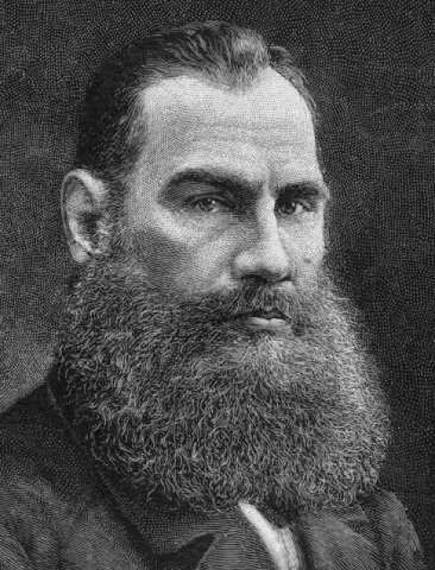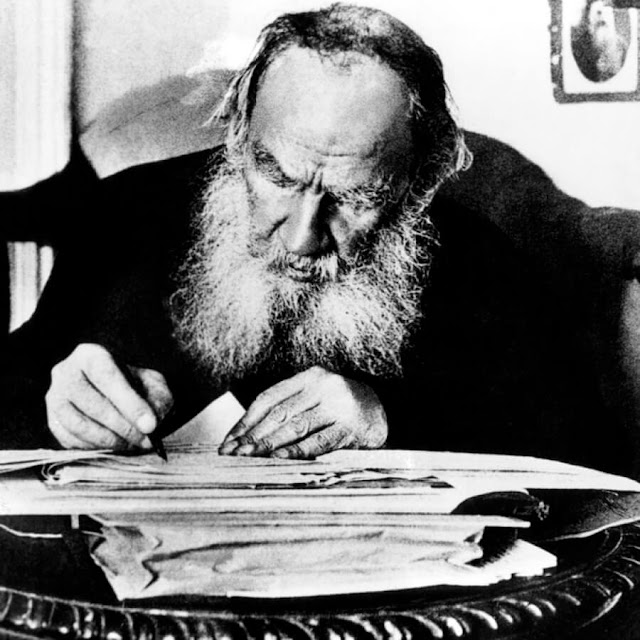Early life
Tolsto was born in an aristocratic family of Russian origin, a Russian legend. According to family history, they were able to trace their family tree to an elderly man named Indris, who left the Mediterranean region and arrived in Chernigov, Ukraine in 1353 with two sons and a neighborhood. With a population of about 3,000. Then his descendants, Moscow, were nicknamed "Thoisto", which means "fat", which inspired the name. Other historians trace the origin of the family in Lithuania in the 14th or 16th century, the founder Peter Tolstoy.He was born on the property of the family and the fourth of five children was born in the count of Nicholas Thomas and his wife, Mary Tolstoy. Due to the conventions of the Russian noble title, Tollius also had the title "Count," though he was not his father's oldest son. His mother died when he was two and his father - when he was 9, so he and most of his siblings were raised by other relatives. In 1844, at the age of 16, he began studying law and language at the University of Kazakhstan, but apparently was a poor student and soon returned to his free time.
Tolsto had not been married for thirty years, and after the death of one of the brothers hit him hard. On September 23, 1862, he married Andreevna Bers (also named Sonia), who was just 18 years old at the time (16 years younger than him) and the daughter of a court physician. Between 1863 and 1888, the couple had 13 children. Eight survived, mostly. Marriage was reportedly happy and passionate at first, although Sonia was uncomfortable with her husband's bad past, but over time their relationship got worse.
Travel and military experience
Tolsto's journey from aristocrat to socially troubled writer created many experiences in his youth. It was about his military service and traveling around Europe. In 1851, accumulating a great deal of gambling debts, he went with his brother to join the army. During the Crimean War from 1853 to 1856, Tolsto was an artillery officer and served in Sevastopol during the famous 11-month siege between 1854 and 1855.Despite being praised for his courage and promoted to lieutenant colonel, Tolstoy did not like his military service. The atrocities, atrocities, and severe loss of life in the war frightened him, and he left the army soon after the war. Together with a number of his compatriots, he visited Europe: one from 1857 and one from 1860 to 1861.
During his 1857 visit, Tolsto was in Paris when he saw the death penalty in public. The painful memory of this experience put something in him and created hatred and distrust of government in general. He concluded that there was no good government, only tools to exploit and corrupt his citizens, and he became a peaceful advocate. In fact, he wrote to Mahatma Gandhi about pragmatism and nonviolent theory.
The subsequent visits to Paris in 1860 and 1861 gave further effects to Stoូo, who would have come to fruition in some of his most famous works. Shortly after reading Virgo Hugo's epic novel, "Light Danger," Thomasston was introduced to Google himself. His war and peace were heavily influenced by Hugo, especially in his interpretation of war and military scenes. Similarly, a visit to the Anarchist Anarchy, Pierre-Joseph Proudhon, gave an idea to the title of his novel, Stevie, and shaped his views on education. In 1862 he achieved these ideals by establishing 13 schools for Russian peasants following the emancipation of Alexander II's peasants. His school was among the first to adopt the ideals of democratic education - education that was supported and guided by democratic ideology but was briefly present due to the hostility of the royalist secret police.
He believed that his first true novel was Anna Carina, published in 1877. The novel follows two major plot lines that cross each other: an unhappy aristocratic woman punishes a cavalry officer and a wealthy landowner who awakens a philosopher and wants to improve the farmer's way of life. It addresses personal topics of morality and betrayal, as well as the larger social issues of social order change, the contrast between urban and rural life, and class divisions. Stylistically, it's at the intersection of realism and modernism.
The Brass of Radical Christianity (1878-1890)
Confession (1879)
Church and State (1882)
What I Believe (1884)
What should I do? (1886)
Death of Ivy Lee (1886)
About Life (1887)
Love for God and Neighbor (1889)
Cruiser Sonata (1889)
After Anna Karenrina Tylstry began to develop more of the moral and religious ideas in his earlier writings at the center of his future work. In fact, he criticized his previous works, including War and Peace, and Anna Karenina, for being unrealistic. Instead, he began to create a turbulent worldview of Christendom that rejected both violence and government.
From 1871 to 1874, Thoreso attempted to raise a hand in poetry by distinguishing himself from his works. He wrote a poem about his enlistment, combining it with some of the tales in Russian reading books, four short works focused on student audiences. At the end of the day, he dislikes and rejects poetry.
Two more books from that period were the novel "Death of Ivan Iich" (1886) and the nonfiction article What Must I Do? (1886) He continued to develop fanatical and religious views on Tollay, with strong criticism of the situation in Russian society. His confession (1880) and "What I Believe" (1884) affirmed their religious beliefs, their support for pacifism and nonviolence, and the choice of poverty and voluntary volunteering.
Political and Moral Author (1890-1910)
The Kingdom of God in You (1893)
Christianity and Patriotism (1894)
Church Fraud (1896)
Revival (1899)
What is religion and what is its essence? (1902)
The Law of Love and the Law on Violence (1908)
In later years, Tolstoy wrote almost exclusively his religious, political, and religious beliefs. He strongly expressed the belief that the best way of life is to strive for personal perfection by obeying the commandment to love God and to love your neighbor rather than the rules set by any church or government on earth. At the end of the day, his idea is that of Tollstone, a Christian anarchist group busy with the life and spread of Tylist's teachings.
In 1901, Tolstoy's radical views led to his expulsion from the Russian Orthodox Church, but he was unsuccessful. In 1899 he wrote his last novel, The Resurrection, which critiqued the churches and the people-led state and tried to justify them. His criticism spread to many foundations of society at the time, including private property and marriage. He hopes to continue to expand his teaching throughout Russia.
Over the last two decades of his life, Tolsto has mainly focused on essay writing. He continued to advocate his anarchist beliefs while warning against the brutal anarchists supported by many anarchists. One of his books, The Inside Kingdom, was an influence on Mahatma Gandhi's peaceful protest theory, and these two men wrote during that year between 1909 and 1910. Individuals should have the values they produce and society should be shared with the values that come from their own country.
Style and literary subject
In his early works, Tolstere was primarily concerned with depicting what he saw around him, especially at the intersection of the public and private sectors. War and Peace, for example, and Anna Karenna, both tell epic stories with serious philosophical support. War and Peace have spent a good deal of time criticizing this, claiming that this is a smaller event, not a major one and that the hero is known. At the same time, Anna Karenina focuses on personal topics such as betrayal, greed, and jealousy as well as focusing on the structures of Russian society, both at the higher levels of the nobility and among the peasants.Subsequently, Tolstoy's writings became religious, moral, and political. He has written extensively about his theories of pacifism and anarchism, in relation to his individual interpretations of Christianity. Tolstoy's essays of his later years are no longer novels with intellectual subjects, but are direct texts, tracts, and other popular works. Asceticism and the work of inner perfection is one that Tolsto advocated in his works.
However, Tolsto was involved in politics, or at least publicly expressed his views on major issues and conflicts today. He wrote in support of boxers during the boxing insurgency in China, condemning the violence of Russian, American, German and Japanese troops. He wrote of the Revolution, but regarded it as an internal battle in which it should be fought in the soul of the individual, not the violent overthrow of the state.
Tolstoy wrote in various styles throughout his life. His most famous novels have a wide interpretation somewhere between realistic and modern, as well as a specific style of continuous penetration from the miniature, which is detailed but very specific to the character’s specificity. Later, as he transitioned from fiction to non-fiction, his language became more moral and philosophical.
Death
At the end of his life, Tulsor reached a turning point in his faith, his family, and his health. He finally decided to part ways with his wife, Sonia, who was strongly opposed to many ideas and was jealous of the attention he paid to his followers for her sake. To escape the slightest conflict, he secretly backed away, leaving the house in the middle of the night in the cold winter.His health deteriorated, and he gave up the luxury of his aristocratic lifestyle. After spending a day traveling by train to his destination somewhere in the south, he collapsed due to pneumonia at the Ashopo train station. Despite calling his own doctor, he died the same day, November 20, 1910, when his funeral procession was on the way, the police tried to restrict access but did not prevent it. Thousands of villagers from the streets set up, though some were there due to the dedication of Tylist. But only curiosity about the nobility passed away.
Inheritance
In many ways, Tylie's legacy cannot be overstated. His moral and philosophical writings inspire Gandhi, meaning that the influence of Tolstoy can be traced in the modern movement of nonviolent struggle. War and peace have been the main sources of countless bestselling novels ever written, and literary creations have been highly regarded since its publication.Tolsto's own life, of its origin, of the nobility, and of the possible denial of privileged existence, continued to draw attention to readers and biographers, and the man himself was equally known for his works. Some of his descendants left Russia in the early 20th century, and many continue to name their chosen profession today. Tolstoy left a rich legacy of heroic literature, captivating characters, and a moral conscience, making him a colorful and unusual writer for many years.







.jpg)




.jpg)

No comments:
Post a Comment
Plz do't add spam links in comment